- President Obama says he will give a speech Wednesday outlining plan to defeat ISIS
- Plan will not involve U.S. troops on the ground, but supporting Iraqi, Kurdish troops there
- Obama: With resources shifted, Americans protected, U.S. to "start going on some offense"
- He wants Congress to "have buy-in" but says he's already authorized to protect U.S.
(CNN) -- President Barack Obama will address the country Wednesday to explain to the nation "what our game plan is going forward" in the fight against ISIS.
In an interview that aired Sunday on NBC's "Meet the Press," Obama expressed confidence that the United States, with help from regional partners, will be able to wipe out the terror organization.
"I just want the American people to understand the nature of the threat and how we're going to deal with it and to have confidence that we'll be able to deal with it," the President told interviewer Chuck Todd.
He said action will include military, diplomatic and economic components. He laid out a three-stage plan that starts with actions the U.S. has already taken: gathering increased intelligence on ISIS, and using airstrikes to protect American personnel, critical Iraqi infrastructure like the Mosul Dam, and cities such as Irbil in Iraqi Kurdistan.
U.S. airstrikes target ISIS fighters near 2nd-largest dam in Iraq
 Is Obama foreign policy cautious or weak?
Is Obama foreign policy cautious or weak?  President Obama faces the press
President Obama faces the press  Dems: Obama too cautious on Isis
Dems: Obama too cautious on Isis 
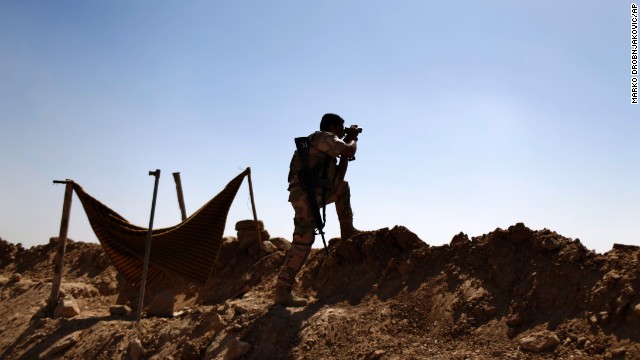 A Kurdish fighter eyes ISIS positions outside Makhmour, Iraq, on Saturday, September 6. Iraqi forces, aided by U.S. military airstrikes, have begun to make gains against terror group ISIS, which calls itself the Islamic State.
A Kurdish fighter eyes ISIS positions outside Makhmour, Iraq, on Saturday, September 6. Iraqi forces, aided by U.S. military airstrikes, have begun to make gains against terror group ISIS, which calls itself the Islamic State.  Iraqis on Friday, September 5, exhume the remains of bodies from a mass grave found after Iraqi Kurdish forces and Shiite militiamen retook the town of Sulaiman Bek from jihadists.
Iraqis on Friday, September 5, exhume the remains of bodies from a mass grave found after Iraqi Kurdish forces and Shiite militiamen retook the town of Sulaiman Bek from jihadists. 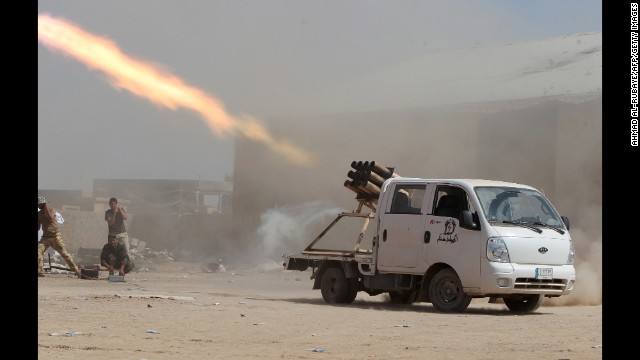 Iraqi Shiite militia fighters fire a rocket toward ISIS positions outside Tikrit, Iraq, on Wednesday, September 3.
Iraqi Shiite militia fighters fire a rocket toward ISIS positions outside Tikrit, Iraq, on Wednesday, September 3.  An Iraqi fighter jet flies over Amerli, Iraq, on September 3. Iraqi forces recently broke the terrorist siege of Amerli from ISIS fighters.
An Iraqi fighter jet flies over Amerli, Iraq, on September 3. Iraqi forces recently broke the terrorist siege of Amerli from ISIS fighters. 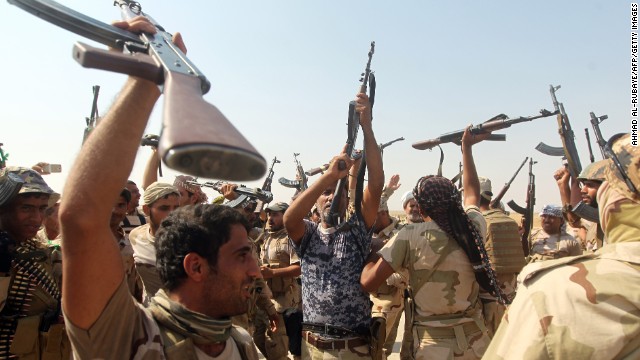 Iraqi volunteer fighters on Monday, September 1, celebrate breaking the siege of the Shiite town of Amerli. ISIS militants had surrounded Amerli, 70 miles north of Baquba, since mid-June.
Iraqi volunteer fighters on Monday, September 1, celebrate breaking the siege of the Shiite town of Amerli. ISIS militants had surrounded Amerli, 70 miles north of Baquba, since mid-June.  Iraqi Shiite Turkmen, mostly women and children, try to board an Iraqi Army helicopter aid flight bringing supplies to Amerli on Saturday, August 30.
Iraqi Shiite Turkmen, mostly women and children, try to board an Iraqi Army helicopter aid flight bringing supplies to Amerli on Saturday, August 30. 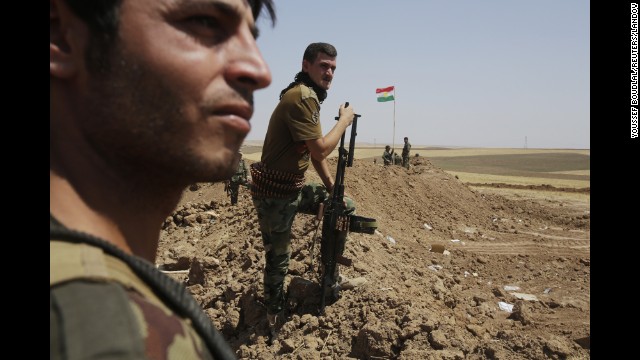 Kurdish Peshmerga forces stand guard at their position in the Omar Khaled village west of Mosul, Iraq, on Sunday, August 24.
Kurdish Peshmerga forces stand guard at their position in the Omar Khaled village west of Mosul, Iraq, on Sunday, August 24. 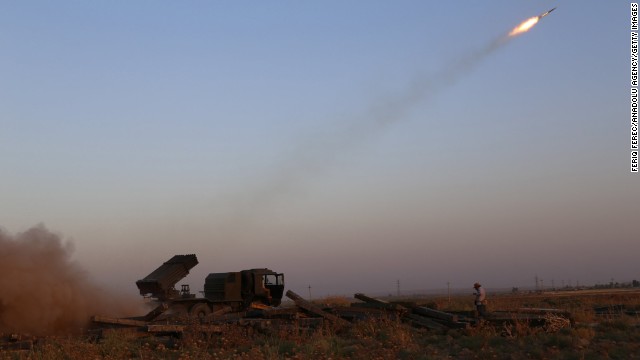 Kurdish Peshmergas fight to regain control of the town of Celavle in Iraq's Diyala province on August 24.
Kurdish Peshmergas fight to regain control of the town of Celavle in Iraq's Diyala province on August 24. 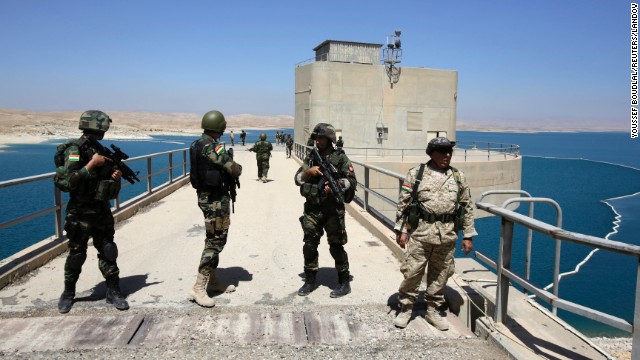 Peshmerga fighters stand guard at Mosul Dam in northern Iraq on Thursday, August 21. With the help of U.S. military airstrikes, Kurdish and Iraqi forces retook the dam from ISIS militants on August 18. A breach of the dam would have been catastrophic for millions of Iraqis who live downstream from it.
Peshmerga fighters stand guard at Mosul Dam in northern Iraq on Thursday, August 21. With the help of U.S. military airstrikes, Kurdish and Iraqi forces retook the dam from ISIS militants on August 18. A breach of the dam would have been catastrophic for millions of Iraqis who live downstream from it.  Displaced Iraqis receive clothes from a charity at a refugee camp near Feeshkhabour, Iraq, on Tuesday, August 19.
Displaced Iraqis receive clothes from a charity at a refugee camp near Feeshkhabour, Iraq, on Tuesday, August 19.  A woman holds her sister during a sandstorm at a refugee camp in Feeshkhabour on August 19.
A woman holds her sister during a sandstorm at a refugee camp in Feeshkhabour on August 19. 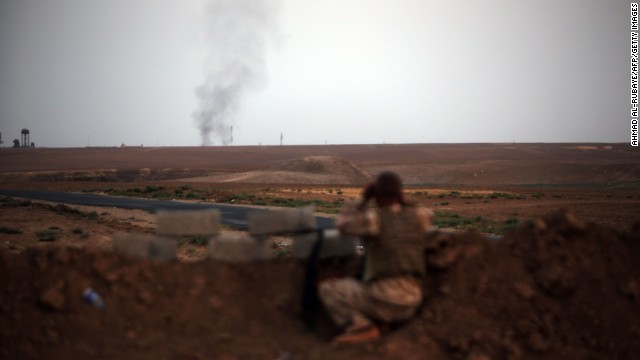 A fighter with Kurdish Peshmerga forces battles ISIS militants near Mosul, Iraq, on Monday, August 18.
A fighter with Kurdish Peshmerga forces battles ISIS militants near Mosul, Iraq, on Monday, August 18.  A Shiite fighter defends a post while backing the Iraqi army in its fight against ISIS militants south of Baghdad on August 18.
A Shiite fighter defends a post while backing the Iraqi army in its fight against ISIS militants south of Baghdad on August 18.  A Kurdish Peshmerga fighter patrols near the Mosul Dam in Chamibarakat, Iraq, on Sunday, August 17.
A Kurdish Peshmerga fighter patrols near the Mosul Dam in Chamibarakat, Iraq, on Sunday, August 17.  Smoke rises after a U.S. airstrike near the Mosul Dam on August 17.
Smoke rises after a U.S. airstrike near the Mosul Dam on August 17.  A Kurdish Peshmerga fighter prepares his weapon August 17 at a combat position near the Mosul Dam.
A Kurdish Peshmerga fighter prepares his weapon August 17 at a combat position near the Mosul Dam.  Trucks carrying Kurdish Peshmerga fighters head to the Mosul Dam on August 17.
Trucks carrying Kurdish Peshmerga fighters head to the Mosul Dam on August 17.  From a position manned by the Kurdish Peshmerga south of Kirkuk, Iraq, Kirkuk Governor Najm al-Din Omar looks through binoculars toward Islamist jihadist positions on August 17.
From a position manned by the Kurdish Peshmerga south of Kirkuk, Iraq, Kirkuk Governor Najm al-Din Omar looks through binoculars toward Islamist jihadist positions on August 17. 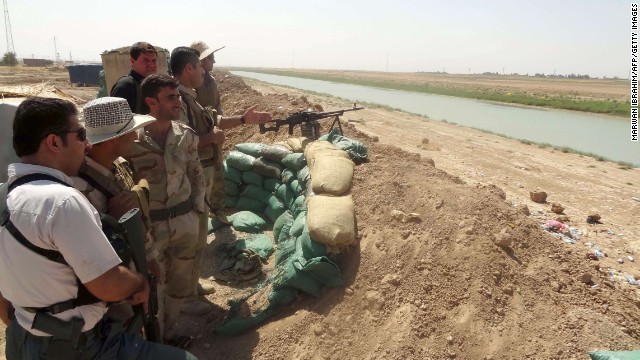 Kurdish Peshmerga fighters stand behind a sand barricade set up close to the village of Bashir, Iraq, on August 17.
Kurdish Peshmerga fighters stand behind a sand barricade set up close to the village of Bashir, Iraq, on August 17. 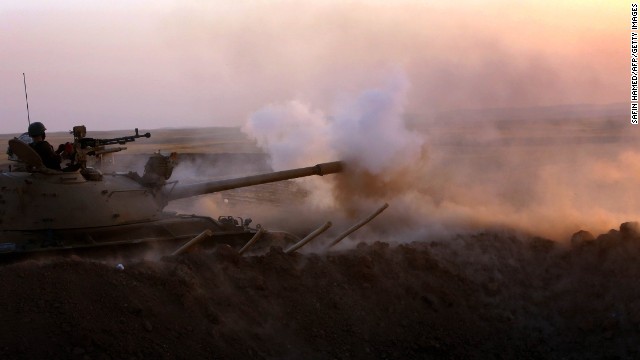 Kurdish Peshmerga fighters fire at ISIS in Khazar, Iraq, on Thursday, August 14.
Kurdish Peshmerga fighters fire at ISIS in Khazar, Iraq, on Thursday, August 14. 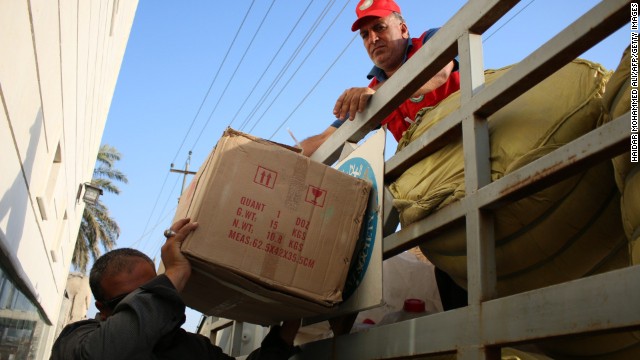 Volunteers of the Iraqi Red Crescent Society unload boxes of goods before distributing them August 14 to families who fled from ISIS.
Volunteers of the Iraqi Red Crescent Society unload boxes of goods before distributing them August 14 to families who fled from ISIS.  Displaced Iraqis of the Yazidi faith reach for bottled water at the Bajid Kandala refugee camp in Iraq's Dohuk province on Wednesday, August 13.
Displaced Iraqis of the Yazidi faith reach for bottled water at the Bajid Kandala refugee camp in Iraq's Dohuk province on Wednesday, August 13.  A Yazidi woman and children take shelter inside a tent at the Bajid Kandala camp on August 13.
A Yazidi woman and children take shelter inside a tent at the Bajid Kandala camp on August 13. 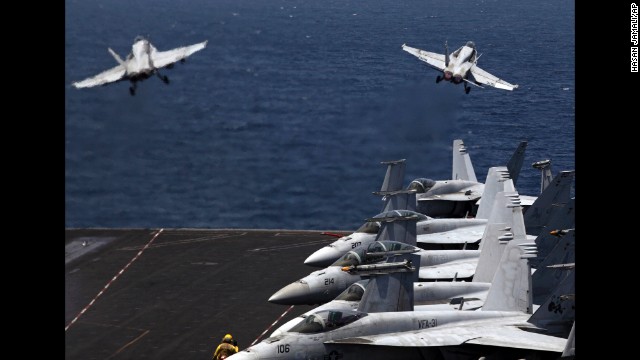 From the flight deck of the USS George H.W. Bush, which is in the Persian Gulf, two U.S. fighter jets take off for a mission in Iraq on Monday, August 11. U.S. President Barack Obama has authorized airstrikes against Islamic militants and food drops for Iraqis who are trapped by the militants.
From the flight deck of the USS George H.W. Bush, which is in the Persian Gulf, two U.S. fighter jets take off for a mission in Iraq on Monday, August 11. U.S. President Barack Obama has authorized airstrikes against Islamic militants and food drops for Iraqis who are trapped by the militants.  Displaced Iraqis of the Yazidi faith cross the Syria-Iraq border on Sunday, August 10.
Displaced Iraqis of the Yazidi faith cross the Syria-Iraq border on Sunday, August 10. 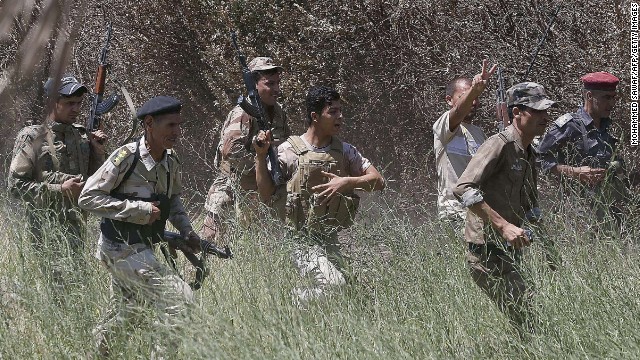 Iraqi soldiers fan out into a field in Jurf al Sakhr, Iraq, on August 10 after they reportedly pushed back Islamic jihadist fighters from the area.
Iraqi soldiers fan out into a field in Jurf al Sakhr, Iraq, on August 10 after they reportedly pushed back Islamic jihadist fighters from the area.  An Iraqi man inspects the debris of houses in Falluja, Iraq, after an apparent air raid by the Iraqi Air Force on August 10.
An Iraqi man inspects the debris of houses in Falluja, Iraq, after an apparent air raid by the Iraqi Air Force on August 10. 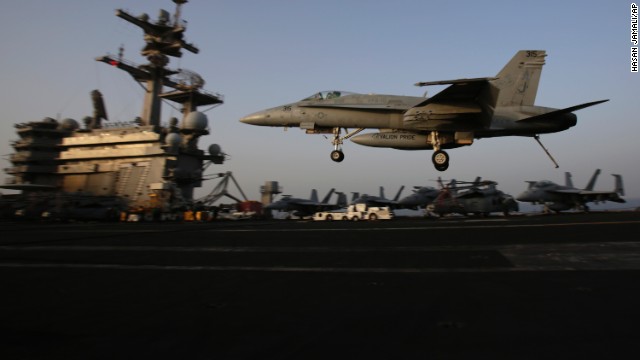 An F/A-18C Hornet lands on the flight deck of the USS George H.W. Bush on August 10.
An F/A-18C Hornet lands on the flight deck of the USS George H.W. Bush on August 10.  An Iraqi Yazidi child, whose family fled their home a week ago when ISIS militants attacked their town, looks on at a makeshift shelter August 10 in Dohuk, which is in Iraq's autonomous Kurdistan region.
An Iraqi Yazidi child, whose family fled their home a week ago when ISIS militants attacked their town, looks on at a makeshift shelter August 10 in Dohuk, which is in Iraq's autonomous Kurdistan region.  Displaced Iraqis from the Yazidi community settle outside the Bajid Kandala camp on Saturday, August 9.
Displaced Iraqis from the Yazidi community settle outside the Bajid Kandala camp on Saturday, August 9.  Displaced Iraqis ride on a truck on a mountain road near the Turkish-Iraq border, outside Dahuk, on August 9.
Displaced Iraqis ride on a truck on a mountain road near the Turkish-Iraq border, outside Dahuk, on August 9.  Thousands of Yazidis are escorted to safety by Kurdish Peshmerga forces and a People's Protection Unit in Mosul on August 9.
Thousands of Yazidis are escorted to safety by Kurdish Peshmerga forces and a People's Protection Unit in Mosul on August 9.  Humanitarian aid for Iraq is loaded onto an aircraft in Norton, England, on Friday, August 8.
Humanitarian aid for Iraq is loaded onto an aircraft in Norton, England, on Friday, August 8. 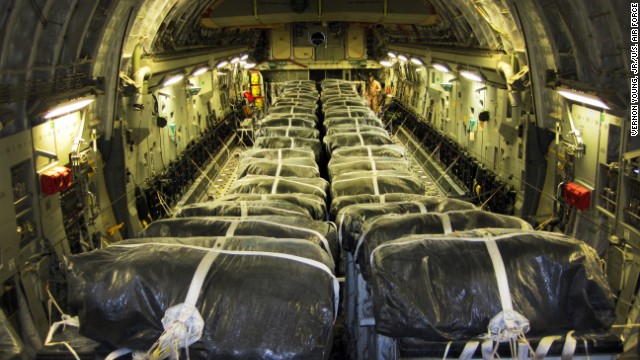 Pallets of bottled water are loaded aboard a U.S. Air Force aircraft in preparation for a humanitarian airdrop over Iraq on August 8.
Pallets of bottled water are loaded aboard a U.S. Air Force aircraft in preparation for a humanitarian airdrop over Iraq on August 8.  Smoke rises after airstrikes targeted ISIS militants outside the Iraqi city of Irbil on Friday, August 8.
Smoke rises after airstrikes targeted ISIS militants outside the Iraqi city of Irbil on Friday, August 8. 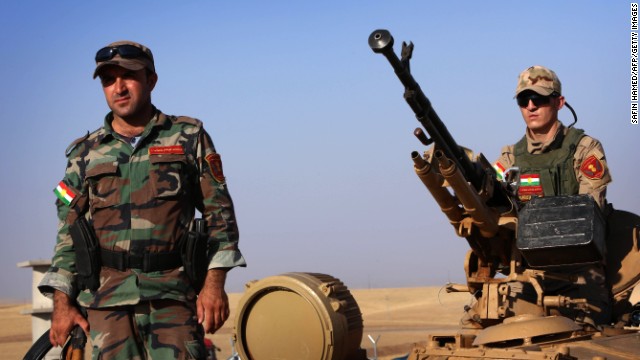 Kurdish Peshmerga fighters take position on the front line on August 8.
Kurdish Peshmerga fighters take position on the front line on August 8.  Displaced Iraqi Christians settle at St. Joseph Church in Irbil on Thursday, August 7.
Displaced Iraqi Christians settle at St. Joseph Church in Irbil on Thursday, August 7. 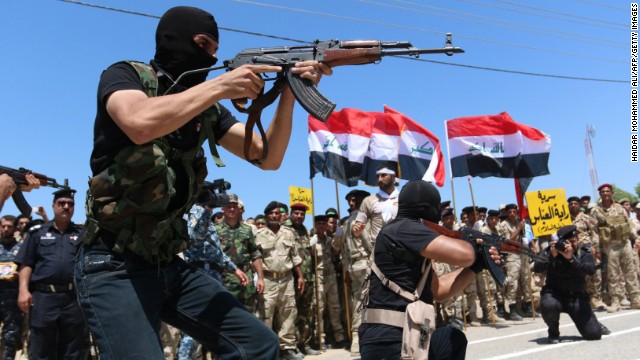 Iraqi Shiite volunteers who have joined government forces to fight ISIS take part in a training session near Basra, Iraq, on August 7.
Iraqi Shiite volunteers who have joined government forces to fight ISIS take part in a training session near Basra, Iraq, on August 7. 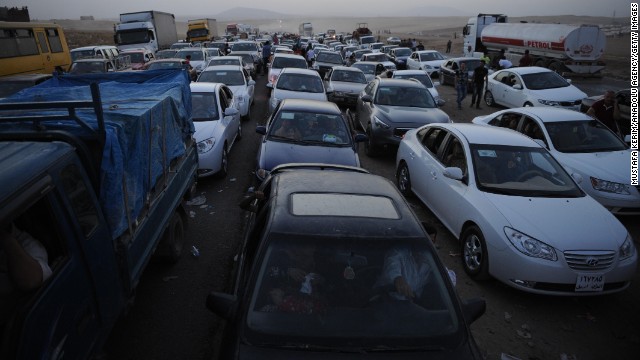 Thousands of Yazidi and Christian people flee Mosul on Wednesday, August 6, after the latest wave of ISIS advances.
Thousands of Yazidi and Christian people flee Mosul on Wednesday, August 6, after the latest wave of ISIS advances.  Kurdish Peshmerga forces and members of the Syrian People's Protection Units engage ISIS members in the Mahmudiye village of Mosul on Tuesday, August 5.
Kurdish Peshmerga forces and members of the Syrian People's Protection Units engage ISIS members in the Mahmudiye village of Mosul on Tuesday, August 5.  Yazidi women who fled violence in Sinjar, Iraq, take shelter at a school in Dohuk on August 5.
Yazidi women who fled violence in Sinjar, Iraq, take shelter at a school in Dohuk on August 5.  People in Mosul walk on the rubble of the destroyed Mosque of The Prophet Yunus, which is Arabic for Jonah, on Thursday, July 24.
People in Mosul walk on the rubble of the destroyed Mosque of The Prophet Yunus, which is Arabic for Jonah, on Thursday, July 24.  An Iraqi child walks through a displacement camp Saturday, June 28, in Khazair, Iraq.
An Iraqi child walks through a displacement camp Saturday, June 28, in Khazair, Iraq.  An Iraqi woman walks with her child outside of a displacement camp June 28 in Khazair.
An Iraqi woman walks with her child outside of a displacement camp June 28 in Khazair.  Peshmerga fighters check cars at the entrance of a temporary displacement camp in Khazair on Thursday, June 26.
Peshmerga fighters check cars at the entrance of a temporary displacement camp in Khazair on Thursday, June 26.  A group of women wait outside the temporary displacement camp in Khazair on June 26.
A group of women wait outside the temporary displacement camp in Khazair on June 26.  Smoke rises in the Karakus district of Mosul as clashes between Iraqi forces and ISIS militants take place on June 26.
Smoke rises in the Karakus district of Mosul as clashes between Iraqi forces and ISIS militants take place on June 26.  Food is handed out at the displacement camp in Khazair.
Food is handed out at the displacement camp in Khazair.  A child walks over discarded water bottles and trash at a registration area in the displacement camp in Khazair on June 26.
A child walks over discarded water bottles and trash at a registration area in the displacement camp in Khazair on June 26. 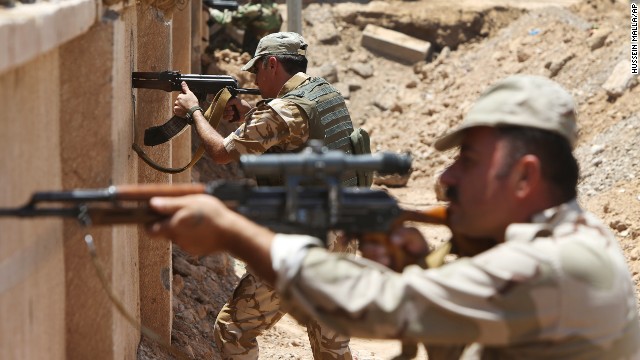 Kurdish Peshmerga take their positions behind a wall on the front line of the conflict with ISIS militants in Tuz Khormato, Iraq, on Wednesday, June 25.
Kurdish Peshmerga take their positions behind a wall on the front line of the conflict with ISIS militants in Tuz Khormato, Iraq, on Wednesday, June 25.  Peshmerga fighters clean their weapons at a base in Tuz Khormato on June 25.
Peshmerga fighters clean their weapons at a base in Tuz Khormato on June 25.  Female Peshmerga between 18 and 45 years old form a special unit that is called to serve in any conditions. A soldier is pictured here on June 25.
Female Peshmerga between 18 and 45 years old form a special unit that is called to serve in any conditions. A soldier is pictured here on June 25.  A woman gathers bread in a temporary displacement camp for Iraqis on Tuesday, June 24.
A woman gathers bread in a temporary displacement camp for Iraqis on Tuesday, June 24.  An ISIS fighter takes control of a traffic intersection in Mosul on Sunday, June 22.
An ISIS fighter takes control of a traffic intersection in Mosul on Sunday, June 22.  An ISIS member distributes a copy of the Quran, Islam's holy book, to a driver in Mosul on June 22.
An ISIS member distributes a copy of the Quran, Islam's holy book, to a driver in Mosul on June 22.  Members of ISIS patrol in Falluja on Saturday, June 21.
Members of ISIS patrol in Falluja on Saturday, June 21.  "Peace Brigade" volunteers raise their weapons and chant slogans during a parade in the Shiite stronghold of Sadr City on Saturday, June 21, in Baghdad. The armed group was formed to protect Shiite holy shrines against possible attacks by Sunni militants.
"Peace Brigade" volunteers raise their weapons and chant slogans during a parade in the Shiite stronghold of Sadr City on Saturday, June 21, in Baghdad. The armed group was formed to protect Shiite holy shrines against possible attacks by Sunni militants.  Iraqi men register to fight alongside security forces Friday, June 20, at a recruitment center in Baghdad.
Iraqi men register to fight alongside security forces Friday, June 20, at a recruitment center in Baghdad. 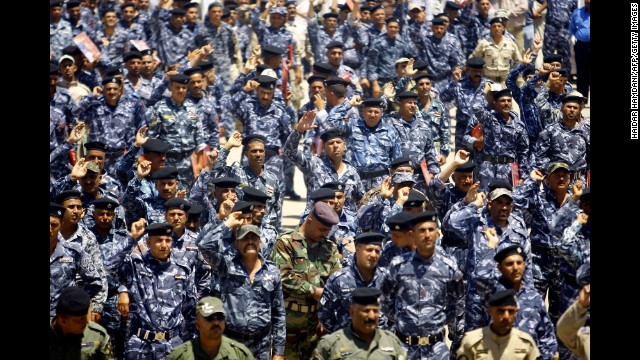 New army recruits gather in Najaf, Iraq, on Wednesday, June 18, following a call for Iraqis to take up arms against Islamic militant fighters.
New army recruits gather in Najaf, Iraq, on Wednesday, June 18, following a call for Iraqis to take up arms against Islamic militant fighters.  Soldiers with an Iraqi anti-terrorism unit are on guard June 18 in Baghdad.
Soldiers with an Iraqi anti-terrorism unit are on guard June 18 in Baghdad.  A Kurdish Peshmerga fighter injured in clashes with ISIS lies in a hospital in Irbil on June 18.
A Kurdish Peshmerga fighter injured in clashes with ISIS lies in a hospital in Irbil on June 18. 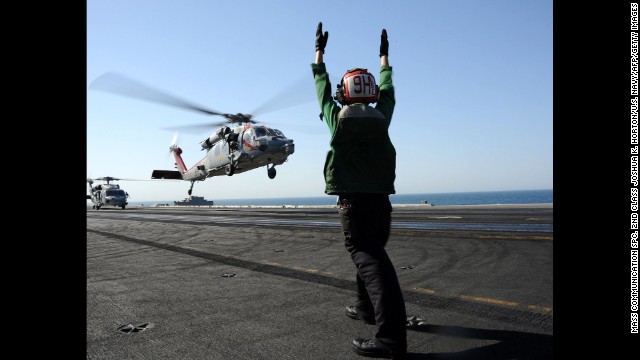 An MH-60R Sea Hawk helicopter lands on the aircraft carrier USS George H.W. Bush in the Persian Gulf on Tuesday, June 17.
An MH-60R Sea Hawk helicopter lands on the aircraft carrier USS George H.W. Bush in the Persian Gulf on Tuesday, June 17. 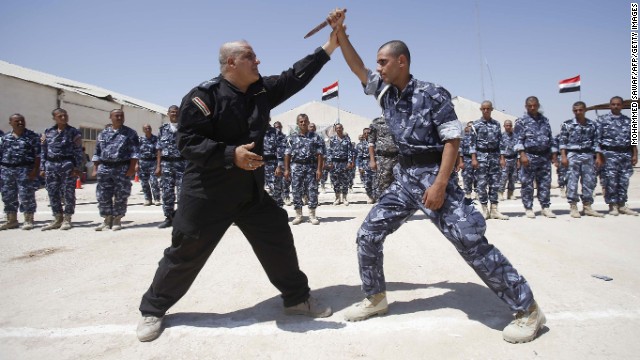 Newly recruited Iraqi volunteer fighters take part in a training session in Karbala, Iraq, on June 17.
Newly recruited Iraqi volunteer fighters take part in a training session in Karbala, Iraq, on June 17.  Iraqi tribesmen gather in Baghdad on Monday, June 16, to show their readiness to join Iraqi security forces in the fight against Islamic militants.
Iraqi tribesmen gather in Baghdad on Monday, June 16, to show their readiness to join Iraqi security forces in the fight against Islamic militants.  Iraqi Christian children gather inside the Church of the Virgin Mary for prayers in Bartala, Iraq, a town near Mosul, on Sunday, June 15.
Iraqi Christian children gather inside the Church of the Virgin Mary for prayers in Bartala, Iraq, a town near Mosul, on Sunday, June 15.  Shiite tribal fighters raise their weapons and chant slogans against ISIS in Basra on June 15.
Shiite tribal fighters raise their weapons and chant slogans against ISIS in Basra on June 15. 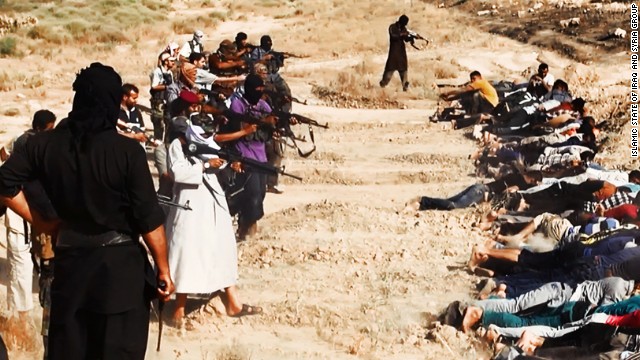 Members of ISIS prepare to execute some soldiers from Iraq's security forces in this image, one of many reportedly posted by the militant group online. CNN cannot independently confirm the authenticity of the images.
Members of ISIS prepare to execute some soldiers from Iraq's security forces in this image, one of many reportedly posted by the militant group online. CNN cannot independently confirm the authenticity of the images.  A woman cradles her baby Thursday, June 12, at a temporary camp set up in Aski Kalak, Iraq, to shelter those fleeing the violence in northern Nineveh province.
A woman cradles her baby Thursday, June 12, at a temporary camp set up in Aski Kalak, Iraq, to shelter those fleeing the violence in northern Nineveh province.  A girl fleeing from Mosul arrives at a Kurdish checkpoint on June 12.
A girl fleeing from Mosul arrives at a Kurdish checkpoint on June 12. 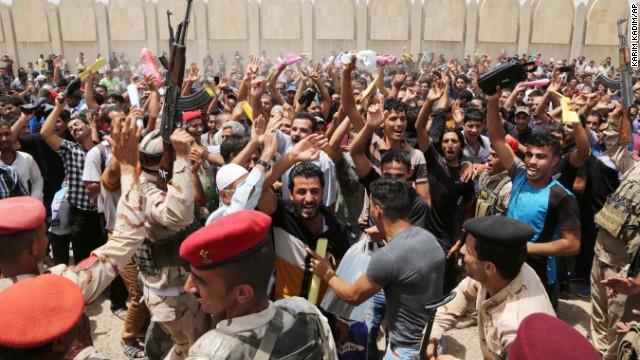 Iraqi men chant slogans outside of an army recruiting center to volunteer for military service June 12 in Baghdad.
Iraqi men chant slogans outside of an army recruiting center to volunteer for military service June 12 in Baghdad. 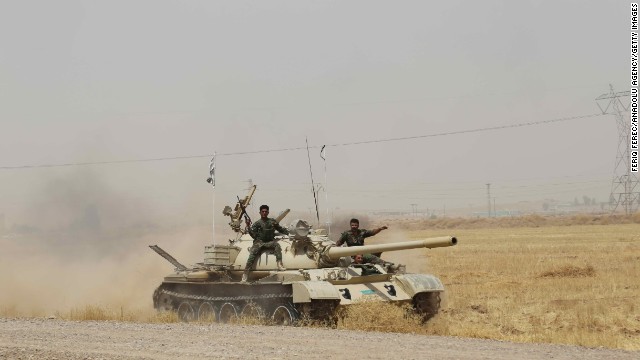 Kurdish Peshmerga forces, along with Iraqi special forces, deploy their troops and armored vehicles outside of Kirkuk, Iraq, on June 12.
Kurdish Peshmerga forces, along with Iraqi special forces, deploy their troops and armored vehicles outside of Kirkuk, Iraq, on June 12. 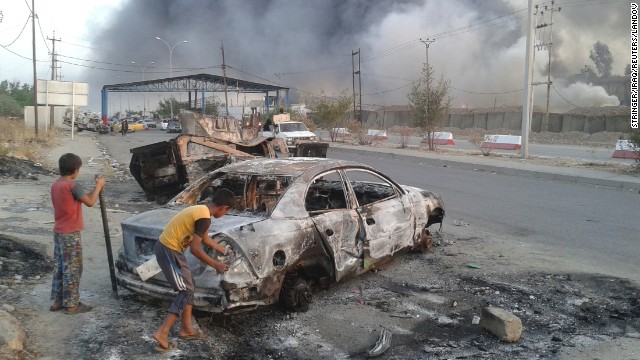 Children stand next to a burnt vehicle during clashes between Iraqi security forces and ISIS militants in Mosul on Tuesday, June 10.
Children stand next to a burnt vehicle during clashes between Iraqi security forces and ISIS militants in Mosul on Tuesday, June 10. 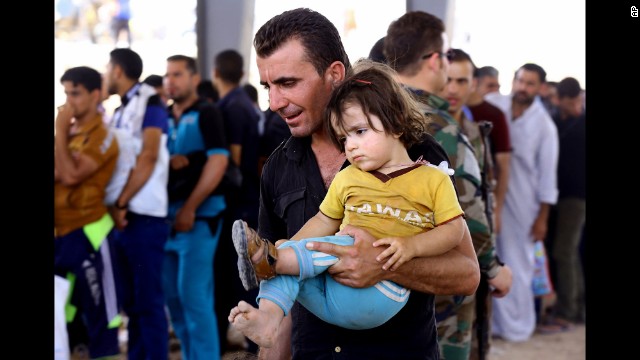 Civilians from Mosul escape to a refugee camp near Irbil on June 10.
Civilians from Mosul escape to a refugee camp near Irbil on June 10.  Iraqis fleeing the violence wait in their vehicles at a Kurdish checkpoint in Aski Kalak on June 10.
Iraqis fleeing the violence wait in their vehicles at a Kurdish checkpoint in Aski Kalak on June 10.  Photos: Iraq under siege
Photos: Iraq under siege "The next phase is now to start going on some offense," he said. "We have to get an Iraqi government in place, and I'm optimistic that next week we should be able to get that done."
He said his speech won't announce the involvement of U.S. ground troops. "We're not looking at sending 100,000 American troops," he vowed.
The President gave his most direct and detailed assessment of ISIS since the terrorist group has brutally decapitated two American journalists and killed thousands of Iraqis. It is a vastly different message than he gave nearly two weeks ago, when he said the U.S. didn't have a strategy "yet" to deal with ISIS in Syria, and in January, when he called it and other groups the JV team.
"Well, they're not a JV team," Obama said in Sunday's "Meet the Press" interview.
The President received praise from recent critics who had said he was too timid as the scope, depth and capabilities of ISIS continue to grow.
"I want to congratulate the President. He is now on offense," Sen. Dianne Feinstein, chairwoman of the Senate Intelligence Committee, said on CNN's "State of the Union."
"It's overdue, but the President is now there," the California Democrat added.
Her counterpart in the House, Rep. Mike Rogers, R-Michigan, chairman of the House Intelligence Committee, echoed Feinstein's sentiment, also on CNN. "This is the toughest talk that we have heard from the President, and I agree with Sen. Feinstein -- that's a good thing because they are a threat."
But not everyone applauded. Sen. Marco Rubio of Florida, who is considering a run for the Republican presidential nomination in 2016 and has criticized Obama for not acting quickly or strongly enough, said, "American foreign policy is in the hands of someone who does not know what he's doing."
"I believe this president has committed a presidential malpractice in his foreign policy," Rubio added on CBS News' "Face the Nation."
Congressional 'buy-in'
Congress returns to Washington this week from a five-week break and will immediately face questions about ISIS.
Obama said he will meet with members of Congress on Tuesday to discuss the administration's strategy, let lawmakers "have buy-in" and debate the plan. But asked by Todd if he was seeking congressional authorization of his strategy, Obama appeared to say no.
 U.S. strikes ISIS near key dam
U.S. strikes ISIS near key dam  See brutal anti-ISIS video
See brutal anti-ISIS video  Is ISIS already inside the US?
Is ISIS already inside the US? "I'm confident that I've got the authorization that I need to protect the American people," he said.
But Sen. Ted Cruz of Texas, who is also considering a 2016 presidential run, said on ABC's "This Week" that any additional military action "should absolutely take congressional approval."
His colleagues in the House, however, didn't agree, saying the President has the constitutional authority to act without Congressional authorization.
The top Republican on the House Homeland Security Committee, Rep. Peter King, R-New York, said, "I believe as commander in chief he has the absolute power to carry out these attacks."
Democratic Rep. Adam Smith of Washington agreed, saying the President doesn't need authorization but that "it would be better if Congress would authorize it."
He added, however, that it would be "extraordinarily difficult" to get through the partisan body, especially less than two months before an election.
Syria
While the U.S. plan to help Iraqi and Kurdish troops take back areas under ISIS control is key to defeating the militants, Obama said the strategy will also have economic and political prongs.
His plan will involve working to "attract back Sunni tribes that may have felt that they had no connection to a Baghdad government that was ignoring their grievances."
As for the military, he insisted U.S. troops will not take the lead.
"We don't have the resources" to "occupy" numerous countries, he said, so a more "sustainable strategy ... means the boots on the ground have to be Iraqi."
But what's unclear still is if he will authorize airstrikes in Syria.
ISIS gained power and strength there trying to defeat Syrian President Bashar al-Assad in that country's complex civil war, and foreign policy hawks have been pushing for the U.S. to strike ISIS command centers and weapons stockpiles.
Obama didn't indicate in the interview aired Sunday whether he was going to move forward with airstrikes but said the U.S. will "need to put more resources" into vetted groups that oppose both al-Assad and ISIS in Syria.
"We're going to have to develop a moderate Sunni opposition that can control territory and that we can work with," he said, insisting there will be no U.S. troops on the ground. "The notion that the United States should be putting boots on the ground, I think, would be a profound mistake. And I want to be very clear and very explicit about that."
"The boots on the ground have to be Syrian," he added.
The U.S. has no plans to move forward alone. After a NATO summit in Wales last week, the President announced the support of nine countries that are committed to pushing back against ISIS. He said his next effort will be to obtain the support of allies in the region. Secretary of State John Kerry is going to spend the upcoming week attempting to gain support from Saudi Arabia, Jordan, Turkey and the United Arab Emirates, the President said.
As strategy firms up, U.S. courts partners to target ISIS
Threat to the U.S.
The President maintains that the terror group, which gained power in war-torn Syria and expanded into Iraq, is not an immediate threat to the U.S. But he noted that "over time" it could become a "serious threat to the homeland" if it is able to continue to expand territory under its control while amassing arms and fighters, especially Western fighters.
Wednesday's speech, which will come a day before the anniversary of the September 11, 2001, attacks, will help the American public better grasp the administration's plan, he said.
"What I want people to understand is that over the course of months, we are going to be able to not just blunt the momentum of (ISIS), we are going to systematically degrade their capabilities, we're going to shrink the territory that they control and ultimately, we're going to defeat them," Obama said.
State Department releases graphic anti-ISIS video
ISIS facts
CNN's Tom Dunlavey contributed to this report.
No comments:
Post a Comment